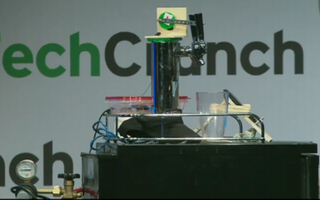 Long beer lines may be the most hipster of first-world problems, but that hasn't stopped a team of self-described "lazy hackers" from doing something about it.
Long beer lines may be the most hipster of first-world problems, but that hasn't stopped a team of self-described "lazy hackers" from doing something about it.Their invention, RoboKeg, makes getting a beer at a crowded concert or bar as easy as waving a hand. It's an automated beer dispenser that can keep track of who's ordering what and how much, and you don't need your wallet or even your cellphone to use it.
Here's how it works: Many bars, clubs and events use wristbands to keep track of who's able to purchase alcohol, so you aren't elbowing your fellow concertgoers while fishing out your driver's license every time you want a drink.
The idea behind RoboKeg is to put a small near-field communication chip in these wristbands that can automate the purchasing and pouring, making those long beer lines fly by faster than you can say 'hit me'
RoboKeg scans the chip in users' wristbands to authenticate their legality. Then you pick your poison by pressing a button, and RoboKeg dispenses the "perfect pour." Billing is sent through the wristband chip to users' mobile phones. So you don't even have to have your mobile phone on you to get your beer — you can pay for it later.
Still not sold? Well, there's more. RoboKeg can recommend beers to you based on the season and weather—lagers for chilly winter nights, pale ale for breezy April evenings, etc. And for every beer purchased, RoboKeg will send a tweet announcing what you ordered.
RoboKeg was developed at this year's TechCrunch Disrupt, a 24-hour hackathon in which teams of programmers and designers come together for a full-day marathon of prototyping and experimentation. Its parts were 3D-printed on-site by Makerbot.
The developers, tech entrepreneurs Chris Jeane, David Kay, Ed Paulosky and Peter Verrillo, say they're currently in talks with a few small NYC bars to implement the first RoboKegs, and hope to eventually market the device at concert venues, ski resorts and other venues across the country.
Certain states' liquor laws might disallow or limit use of RoboKeg, however. In states where it's illegal to serve alcohol to a visibly intoxicated person, for example, you'd still need a human bartender to monitor the people buying beer from RoboKeg.





